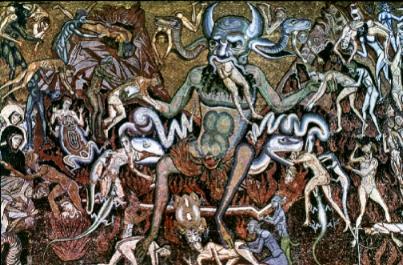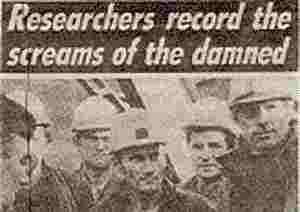OK, this might not be entirely what
Rick Brannan had in mind when he suggested some attempt an ‘opposite blogging day’, but my creative juices weren’t driving me in any other direction, and my analytical energy levels certainly couldn’t manage anything even remotely serious.
So, I’m glad to introduce you, tonight, to
Cardinal Spin. In the following, he shall be sharing his considered thoughts concerning that most sensitive of subjects: ‘Christian counselling’
-------------
Thanks for giving me this opportunity, Chris, to post on your blog. You come across a bit liberal sometimes though, so stop it and start using the KJV you freak.
I want to share my thoughts on my approach to ‘Christian counselling’, as so many get this wrong. To do this, I will give an example from my own ministry experience. No theological ‘theory’ crap here:
The situation: Recently, an old woman came to me – big fat lard she was – to discuss her ‘problems’. I was only visiting the church, but she saw my dog-collar and made a beeline for me as I walked into the back of the chapel from the car park. So I took her aside and she told me the awful story of her failed marriage and of her kids who recently left the church youth group to become Nazis.
But through all of this pain she still had her beloved poodle dog.
‘Smoochee’, she affectionately called it – even had a
picture of it. Ugly bastard. But then she got all tearful as she told me how she’d run it over while reversing into the garage. Of course, I was fighting off a smirk when she told me that she’d managed to run Smoochee over twice during this episode, but funniest of all was when she broke down into tears as she detailed the business with the liposuction and her belly button. But I’ll leave out the details.
‘What should I do?’, she asked with pained eyes.
Sensitive counselling in action: Having heard her speak for a while I interrupted her before she could go on for too long. That’s the first principle. ‘Interrupt’ if you can’t be bothered to hear anymore crap. And how to do that? Well, I said ‘shut up and stop whining woman’, a suggestion that was successfully returned with stunned silence.
‘Right’, I continued, ‘I can see what your problem here is *waving a pointed finger*.
‘Clearly ... for such awful stuff to happen to you ... to have such a pitiful life ...
*imaginary drum roll*
... you obviously have
siiiin in your life (I stressed the word ‘sin’ and made it sound about three syllables longer). Yes, that would be
Iniquity, woman. Wick-ed-ness. Eeeevil’.
At this point her eyes started to fill with tears so I made the following deduction: She is clearly under conviction, ergo I am obviously operating under the anointing.
‘What?’, she quivered. But I had no time for sissy talk, so I got straight to the point: ‘Dear, you’re a disgusting sinner, and that’s why all of these things have happened’. Her face wrinkled into thought so I reassured her: ‘Listen, I do know what I’m talking about, OK? Cos I’m a priest. OK?
*I paused and glared to make sure she’d ‘received’ that*
I continued: ‘Good. Right, what you need to do is obvious’.
Then I looked long and hard at her and told her the age old wisdom that has gotten me through decades of counselling: ‘Old hag, what you need to do is simple:
One, Repent more *I glared at her for effect and looked for signs of conviction*.
Two, read your bible more.
Three, fast more *I jabbed her fat waist* (Here I also muttered something Zwingli said – cf. fn.* below).
Four, pray more *I grinned at her to make her feel more comfortable*.
And finally, five!. Just be generally more holy and excited about church *I waved my hands around to make clear everything I’d said was utterly self-evident*’.
She looked back at me. But I kept eye contact.
Eventually, I noticed that her face had slowly started to get a bit ‘hard’, and her eyes had narrowed.
Knowing that I’d hit the nail on the head with the ‘siiiiiiin’ speech, I’d expected this. And for those of us who have done this sort of thing before, I ‘discerned’ what was going on. Behind those pursed lips was none other than a religious Jezebel spirit. Without further ado, I grabbed her head and cried out in a loud voice ‘COME FORTH THOU JEZEBEL SPIRIT OF EVIL HARD HEARTEDNESS AND UTTER DOG-MURDERING WICKEDNESS’
She struggled to prise my hands away, so I slapped her and repeated my command with more gusto. I was starting to really enjoy myself.
At this moment the actual Priest, who had heard my authoritative commands, rushed to the scene and foolishly pushed me away. He threw his arms around the woman (who was now sobbing in uncontrollable tears), while I quietly but quickly made my way out of the side door back in to the car park.
So, to summarise this successful ministry moment: Interrupt. Be anointed. Speak the truth. Make the sicko who needs help feel comfortable. Take authority. Have fun!
Footnotes:
*
‘Einen Grund für das Fasten sieht er, ganz modern, darin, daß wir "damit den allzu schamlos vortretenden Wanst wieder in das alte Kleid hineinbringen’ (Zwinglis Sämtliche Werke, Vol III, p. 674, line 42)Labels: Cardinal Spin





















